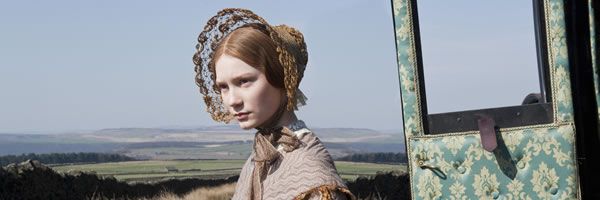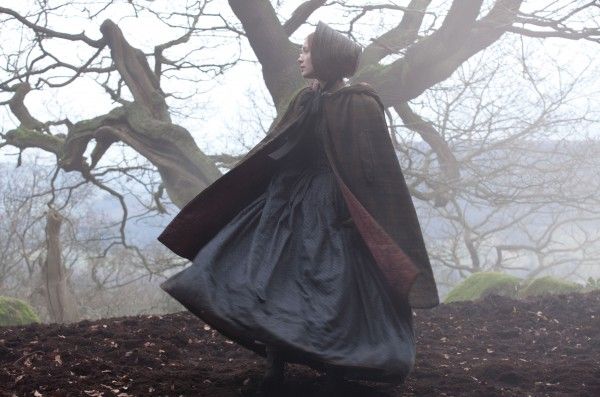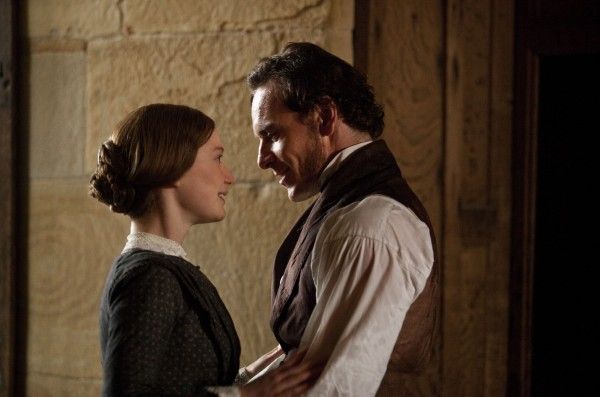There's a vast gulf between adapting a gothic period romance and connecting with a modern audience. Director Cary Fukunaga doesn't give a damn about that gulf and his adaptation of Charlotte Bronte's Jane Eyre is a lush, confident, and powerful film as a result. Fukunaga embraces the gothic atmosphere to create a haunting portrayal of a romance between a young woman who never loses her sense of self-worth despite the constant cruelty she receives and a man who has attempted to become aloof in order to hide a bizarre and horrifying secret. Anchored by tremendous performances from lead actors Mia Wasikowska and Michael Fassbender, Jane Eyre plays on its own terms and audiences who understand the game will be richly rewarded.
The story has a bit of a tough time finding its footing as we're taken through an awkward framing device and then a flashback into the childhood of Jane Eyre (Wasikowska). An orphan who is hated by her aunt (Sally Hawkins), Jane is sent off to boarding school where she is treated cruelly by the staff and forced to stand upon "the pedestal of infamy." She eventually graduates and becomes a governess at Thornfield, a castle belonging to the mysterious Mr. Rochester (Fassbender). Impressed by Jane's confidence, wit, and self-reliance, Rocheter begins a flirtation with the "poor and obscure" young woman that crosses social class and their emotional defenses.
Once Fassbender enters the picture, the film clicks together beautifully. Pre-Rochester, Jane's story is too Dickensian and watching her face the unwarranted cruelty of authority figures feels drab. But once the romance story comes into play, everything else in the film comes alive. The mysterious horror surrounding Thornfield feels more thematically relevant, and all of the technical elements blossom. The viewer no longer gets hung up on silly lines like Rochester's declaration that he has "all of his limbs and features" because the world is so rapturous and vibrant. The cinematography is gorgeous, the score is haunting, and the costumes look traditional yet inspired.
While Fukunaga has crafted a stunning picture, a great deal of credit is due to Wasikowska and Fassbender. Their characters are the entry point into the entire picture and if we don't care about them, then all of Fukunaga's hard work is meaningless. I was disappointed that last year's Alice in Wonderland didn't showcase Wasikowska's tremendous acting ability, which I had seen from her work on In Treatment. Jane Eyre finally provides that showcase and proves that if there's a role out there for a serious young actress, Wasikowska must be considered. As for Fassbender, he continues to be one of my favorite actors working today and his meteoric rise over just a few years is well-deserved. Much like he did in 2009's Fish Tank, he keeps you guessing to his character's true motives while seducing you with his smoldering intensity.
Fukunaga has made a film that may be impenetrable to those who can only enjoy movies that are drenched in pop-culture and irony. He's created a beautiful, intriguing gothic romance that eschews mainstream accessibility in favor of taking audiences into a world that's rarely seen in Hollywood movies. It would be easy to be cynical and snide about Jane Eyre if there was anything less than total devotion from Fukunaga and his lead actors, but everyone has thrown themselves into this world so completely that it's almost impossible not to follow.
Rating: B+



